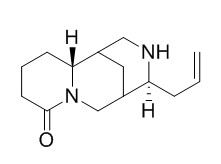Angustifoline
Angustifoline has activity against gram-positive bacteria. It inhibits human colon cancer cell growth by inducing autophagy along with mitochondrial-mediated apoptosis, suppression of cell invasion and migration and stimulating G2/M cell cycle arrest.
Inquire / Order:
manager@chemfaces.com
Technical Inquiries:
service@chemfaces.com
Tel:
+86-27-84237783
Fax:
+86-27-84254680
Address:
1 Building, No. 83, CheCheng Rd., Wuhan Economic and Technological Development Zone, Wuhan, Hubei 430056, PRC
Providing storage is as stated on the product vial and the vial is kept tightly sealed, the product can be stored for up to
24 months(2-8C).
Wherever possible, you should prepare and use solutions on the same day. However, if you need to make up stock solutions in advance, we recommend that you store the solution as aliquots in tightly sealed vials at -20C. Generally, these will be useable for up to two weeks. Before use, and prior to opening the vial we recommend that you allow your product to equilibrate to room temperature for at least 1 hour.
Need more advice on solubility, usage and handling? Please email to: service@chemfaces.com
The packaging of the product may have turned upside down during transportation, resulting in the natural compounds adhering to the neck or cap of the vial. take the vial out of its packaging and gently shake to let the compounds fall to the bottom of the vial. for liquid products, centrifuge at 200-500 RPM to gather the liquid at the bottom of the vial. try to avoid loss or contamination during handling.
Int J Mol Sci.2023, 24(24):17589.
Int Immunopharmacol.2023, 125:111175.
PLoS One.2018, 13(11):e0208055
Cell Death Differ.2021, 1-8.
J Plant Biotechnol.2023, 50:070-075.
J Ethnopharmacol.2017, 206:327-336
J Nat Prod.2023, 86(2):264-275.
J Appl Biol Chem.2022, 65(4):pp.463-469.
Molecules.2020 ,25(16):3697.
Univerzita Karlova2022, 228192.
Related and Featured Products
Annals of the Entomological Society of America, 1984, 77(4):398-400.
Lupine Alkaloids as Larval Feeding Deterrents for Spruce Budworm, Choristoneura fumiferana (Lepidoptera: Tortricidae).[Reference:
WebLink]
Twelve lupine alkaloids, eight from Lupinus polyphyllus (Lindl), were tested in feeding bioassays against sixth instar spruce budworm, Choristoneura fumiferana (Clemens).
METHODS AND RESULTS:
Feeding deterrence was found in the alkaloid fraction of L. polyphyllus extracts. Eight lupine alkaloids shown to be present in the extract were tested at the rate of 25 μg per feeding disc. Of these compounds, 13-trans-cinnamoyloxylupanine and 13- tigloyloxylupanine were highly deterrent, whereas lupanine, sparteine, 13-hydroxylupanine, tetrahydrorhombifoline, Angustifoline, and 17-oxolupanine, were not. Four alkaloids not present in L. polyphyllus, lupinine, epilupinine, α-isolupanine, and lupinyl-trans-cinnamate, were not active at 25 μg per feeding disc.
CONCLUSIONS:
Clearly, there is wide variability in the response of spruce budworm larvae, which are not adapted to feeding on alkaloids, to various alkaloids within the same structural class. If this variability in response is general among herbivores, perhaps the presence of an alkaloid is not significant with regard to defense, whereas diversity in structure of alkaloids may deter generalist grazers.
Journal of Plant Physiology, 1988, 133(2):240-242.
The Effect of Lupin Alkaloids and Ethanol Extracts from Seeds of Lupinus angustifolius on Selected Bacterial Strains.[Reference:
WebLink]
METHODS AND RESULTS:
The following pure alkaloids were isolated from lupin seeds (L. angustifolius var. Mirela): lupanine, 13-OH-lupanine, Angustifoline and a 48 % ethanol extract. They and the commercial sparteine were tested for bacteriostatic effects against pathogenic bacteria, namely, Gram-positive (Staphylococcus aureus ATCC 25923, Bacillus subtilis ATCC 6633) and Gram-negative (Escherichia coli ATCC 25922, Pseudomonas aeruginosa ATCC 27853); a strain of Gram-positive Bacillus thuringiensis HD-4 with sporeforming rods, isolated from soil, was also tested.The established bacteriostatic agents, e.g. antibiotics, are active at a concentration 3 to 4 orders of magnitude lower than the tested lupin alkaloids.
CONCLUSIONS:
Therefore a bacteriostatic effect is possible in plants under physiological conditions, but a pharmaceutical application of these products as bacteriostatic agents is rather unlikely. The presented data support the allelopathic function of alkaloids.
Journal of B.U.ON. : official journal of the Balkan Union of Oncology, 2019.
Angustifoline inhibits human colon cancer cell growth by inducing autophagy along with mitochondrial-mediated apoptosis, suppression of cell invasion and migration and stimulating G2/M cell cycle arrest.[Reference:
WebLink]
The prime objective of the present study was to investigate the anticancer properties of Angustifoline against COLO-205 human colon cancer cells. Its effects on cell autophagy, apoptosis, cell invasion and cell migration, and cell cycle arrest were also evaluated in the current study.
METHODS AND RESULTS:
WST-1 assay was used to study cytotoxic effects of the compound on the cell viability. Effects on apoptosis and cell cycle arrest were evaluated by flow cytometry. In vitro wound healing assay and matrigel assay were carried out to study the effects of Angustifoline on cell migration and cell invasion respectively. To confirm autophagy, we evaluated the expression of several autophagy-associated proteins using Western blot assay along with transmission electron microscopy (TEM).
CONCLUSIONS:
The findings indicated that Angustifoline induced dose- and time-dependent cytotoxicity in COLO-205 human colon cancer cells along with inhibiting cancer cell colony formation. Angustifoline-treated cells exhibited cell shrinkage along with distortion of the normal cell morphology.
3''-Galloylquercitrin
Catalog No: CFN95048
CAS No: 503446-90-0
Price: $368/5mg
7,2',4'-Trihydroxy-5-methoxy-3-arylcoumarin
Catalog No: CFN95070
CAS No: 1092952-62-9
Price: Inquiry(manager@chemfaces.com)
Orcinol 1-O-beta-D-apiofuranosyl-(1->6)-beta-D-glucopyranoside
Catalog No: CFN95109
CAS No: 868557-54-4
Price: $338/5mg
Yuanhunine
Catalog No: CFN95179
CAS No: 104387-15-7
Price: $368/5mg
(1E)-3-methoxy-8,12-epoxygermacra-1,7,10,11-tetraen-6-one
Catalog No: CFN95219
CAS No: 1393342-06-7
Price: $413/5mg
Lappaol B
Catalog No: CFN95242
CAS No: 62359-60-8
Price: $333/10mg
1-(3',5'-dimethoxy)phenyl-2-[4''-O-beta-D-glucopyranosyl (6->1)-O-alpha-L-rhamnopyranosyl]phenylethane
Catalog No: CFN95285
CAS No: 1338076-61-1
Price: $413/5mg
11-Oxomogroside IIA2
Catalog No: CFN95305
CAS No: 2170761-37-0
Price: $368/5mg
4'-Hydroxy-3',5,5',6,7,8-hexamethoxyflavone
Catalog No: CFN95407
CAS No: 85644-03-7
Price: $318/5mg
Pinocembroside
Catalog No: CFN95444
CAS No: 75829-43-5
Price: $118/20mg



